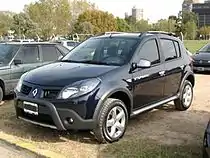Renault do Brasil
Renault do Brasil (Portuguese pronunciation: [ʁeˈno du bɾaˈziw]), formerly Renault do Brasil Automoveis, is the Brazilian subsidiary of the French car manufacturer Renault. It was established in 1997,[1] and is Brazil's fifth largest automaker by sales. In 2012, Brazil was the second largest market for Renault.[6]
 | |
| Type | Subsidiary |
|---|---|
| Industry | Automotive |
| Founded | 1997 |
| Headquarters | , Brazil[1] |
Key people | Ricardo Gondo (CEO)[2] |
Production output | |
| Revenue | |
| Total assets | |
| Total equity | |
Number of employees | 6,300 (2012) |
| Parent | Renault |
| Subsidiaries | Renault do Brasil Comércio e Participações Ltda. (automotive parts selling)[5] |
| Website | renault.com.br |
History
Renault has been present in Brazil since the 1960s, initially through a partnership with the American company Willys Overland, which produced under license cars of the French automaker. At the end of 1961, Willys introduced the Interlagos, a copy of the Alpine A110,[7] producing also other models, like the Dauphine[8] and the Dauphine Gordini, until 1968. That year Willys Overland sold its operations to Ford do Brasil, which inherited the "project M". This project, developed by the Renault and Willys partnership, resulted in the launch of the Ford Corcel, a car whose style can be considered, roughly, an Americanized version of the Renault 12 with a CH1 engine.[7]
In the 1970s, Brazil ended car imports and Renault did not return until 1992, when the company's Argentinean and Brazilian operations were taken by the holding company COFAL SA. In 1997, Renault retook the control of its operations in Argentina and Brazil.[9] In Brazil, Renault formed the subsidiary Renault do Brasil Automoveis.[1] In 1998, it opened the Ayrton Senna manufacturing complex in São José dos Pinhais, Curitiba.[10][11] With the aim of financing the construction of the facilities Renault agreed to give the State of Paraná a 40% stake in exchange of US$1.2 billion. This stake would be mostly returned to Renault after seven years. Despite its success, the agreement found some political dissensus.[12]
The first Renault cars manufactured in Brazil were the Scenic and the Clio[10] (the production of the latter was moved to Renault Argentina in 2007). The company also produced the Megane in sedan and estate versions, which ended between 2010 and 2012. Later, it entered into production the Sandero, the Logan and the Duster.[13]
Operations
The Ayrton Senna complex, with 2.5 million square meters, consists of a passenger car plant (bodywork and assembly) opened in 1998, an engine plant, Mecanica Mercosul, opened in 1999, and a light commercial vehicle (LCV) plant, operated jointly with Nissan.[11]
In August 2011, Renault announced an investment plan of R$1.5 billion for expanding the production to 320,000 vehicles by 2015. In 2011, the Brazilian growth of Renault was seven times bigger than the market average, with 194,300 cars sold and a market share of 5.7%. That year the company produced 256,200 cars and vans and 332,000 engines.[14]
A 41% of the cars, engines and parts produced are exported, with destinations such as the Renault subsidiaries in Argentina (22%), Colombia (13%), Romania and Mexico (4%).[14]
On 2 August 2012, Renault announced its plans to expand Mecanica Mercosul's production output with 25% by 2013.[15]
Renault Design America Latina
In April 2008, Renault opened in São Paulo its first design center in the Americas.[16] It designed the Sand'Up concept, which was unveiled at the 2008 São Paulo International Motor Show,[17] It also conceived the Sandero Stepway concept in 2010 and collaborated in the Duster design.[11] The center also designed the D-Cross (a Duster-based concept), which was unveiled at the 2012 São Paulo International Motor Show.[18] The design studio also modified the production Sandero and Logan to adapt them to the local markets.[11]
Cars currently being manufactured

- Renault Sandero II (2014–present)
- Renault Master III (2012–present)
- Renault Logan II (2013–present)
- Renault Duster (October 2011–present)[19]
- Renault Duster Oroch (2015 to present)
- Renault Captur (2016–present)
- Renault Kwid (2017–present)
Cars formerly manufactured
- Renault Clio II (October 1999–2007)
- Renault Scénic (January 1999–July 2010)[20]
- Renault Mégane II (2006–circa 2012)
- Renault Master II (2001–2012)
- Renault Logan I (2007–2013)
- Renault Sandero I (2007–2014)
Ownership
As of 2011, 80.29 percent of the company was controlled indirectly by Renault through the holding Compagnie Financière pour L'Amérique Latine (COFAL),[21] which also had shares in Renault Argentina and is mainly owned by the automaker.[9] A 19.56 percent was owned directly by Renault of France. The State of Paraná held the remaining shares.[21]
References
- "Company Description: Renault do Brasil SA". businessweek.com. BusinessWeek. Archived from the original on January 18, 2013. Retrieved 4 October 2012.
- Fagundes, Dyogo (21 December 2018). "Renault do Brasil anuncia Ricardo Gondo como novo presidente" [Renault do Brasil announces Ricardo Gondo as new CEO]. motor1 (in Portuguese). Retrieved 30 December 2018.
- "Anuário da Indústria Automobilística Brasileira 2019" [2019 Brazilian Automotive Industry Yearbook] (PDF) (in Portuguese). ANFAVEA. p. 103. Retrieved 8 November 2019.
- "Renault do Brasil S.A. Demonstrações financeiras em 31 de dezembro de 2018 e 2017" [Renault do Brasil S.A. Financial statements as of 31 December 2018 and 2017] (PDF) (in Portuguese). Renault do Brasil. pp. 8–9. Retrieved 8 November 2019.
- "Renault do Brasil S.A.". Diário Oficial do Paraná. Comércio, Indústria e Serviços (in Portuguese). State of Paraná (8937): 63–68. 15 April 2013.
- "Sales in 2012". Renault. Retrieved 28 June 2013.
- "Willys" (in Portuguese). Carroantigo.com. Retrieved 4 October 2012.
- Wolfe, Joel (2010). "The Multinational Solution". Autos and Progress: The Brazilian Search for Modernity. Oxford University Press. p. 121. ISBN 978-0-19-517457-1.
- Varela, Luis (11 April 1997). "Habrá una Renault Mercosur" [It will be a Mercosur's Renault]. clarin.com (in Spanish). Clarin. Retrieved 4 October 2012.
- Mariotto, Fábio (2010). "Renault do Brasil S.A." (PDF). Revista Brasileira de Casos de Ensino Em Administração (in Portuguese). Fundação Getulio Vargas/Escola de Administração de Empresas de São Paulo: 1. doi:10.12660/gvcasosv0n0c1. ISSN 2179-135X. Archived from the original on 31 December 2018.
- "Renault in Brazil". Renault. Retrieved 4 October 2012.
- Conceição, Pedro (2002). Knowledge for Inclusive Development. Greenwood Publishing Group. p. 344. ISBN 1567204449.
- "Fábrica da Renault no Brasil completa 15 anos" [Renault plant in Brazil reaches 15 years]. Automotive Business (in Portuguese). 4 December 2013. Retrieved 1 June 2018.
- "Lucros das montadoras vão balizar as negociações salariais e de PLR dos metalúrgicos da Grande Curitiba" [Profits from automakers will delimit the wage negotiations and PLR of Curitiba's metalworkers] (in Portuguese). Simec.com.br. 21 March 2012. Retrieved 4 October 2012.
- "Renault SA To Boost Motor Production In Brazil By 25%". reuters.com. Reuters. 2 August 2012. Retrieved 5 October 2012.
- Ozler, Levent (22 April 2008). "Renault Design America Latina". Dexigner. Retrieved 4 October 2012.
- "Renault Sand'Up Concept Premieres at Sao Paulo Motorshow". Carscoop.com. 27 October 2008. Retrieved 5 October 2012.
- "2012 São Paulo Motor Show: Novo Clio, Fluence GT and D-Cross in the spotlight". Renault Blog. 22 October 2012. Retrieved 6 November 2013.
- "Renault". Renault do Brasil. Retrieved 4 October 2012.
- "Renault Scenic enfim sai de produção no Brasil" [Renault Scenic finally ends production in Brazil]. Encontracarros (in Brazilian Portuguese). 2010-07-29. Archived from the original on 2022-01-04.
- "RENAULT TO INCREASE ITS PRODUCTION CAPACITY IN BRAZIL BY 100,000 UNITS PER YEAR IN 2013". Renault UK. 5 October 2011. Retrieved 5 October 2012.
